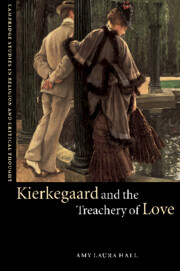Book contents
- Frontmatter
- Contents
- List of abbreviations
- Preface
- Introduction
- 1 The call to confession in Kierkegaard's Works of Love
- 2 Provoking the question: deceiving ourselves in Fear and Trembling
- 3 The poet, the vampire, and the girl in Repetition with Works of Love
- 4 The married man as master thief in Either/Or
- 5 Seclusion and disclosure in Stages on Life's Way
- 6 On the way
- Notes
- Works cited
- Index
5 - Seclusion and disclosure in Stages on Life's Way
Published online by Cambridge University Press: 22 September 2009
- Frontmatter
- Contents
- List of abbreviations
- Preface
- Introduction
- 1 The call to confession in Kierkegaard's Works of Love
- 2 Provoking the question: deceiving ourselves in Fear and Trembling
- 3 The poet, the vampire, and the girl in Repetition with Works of Love
- 4 The married man as master thief in Either/Or
- 5 Seclusion and disclosure in Stages on Life's Way
- 6 On the way
- Notes
- Works cited
- Index
Summary
… the lover has with his beloved the most priceless amusement and the most interesting subject of study in his life.
(Constantin Constantius, SLW, 55)As far as I am concerned, the emphasis must be placed elsewhere – whether I was actually capable of giving my life the kind of expression that a marriage requires.
(Diarist, SLW, 195)This mode of answering, to swing away from the direction of the question … in order instantaneously to press the task as close as possible to the questioner, what he has to do – this is characteristic of the essentially Christian.
(WL, 96)INTRODUCTION
Stages on Life's Way, which Kierkegaard subtitled “Studies by Various Persons,” is a set of texts “compiled,” “stitched together,” “forwarded to the press, and published by Hilarius Bookbinder” (SLW, i, 4). This book is an interlocked, “stitched together” world of various characters, many of whom we have already met in earlier chapters. And each previously noted occasion for confusion and error becomes extreme here. William Afham (a new character) narrates the first section, entitled “In Vino Veritas,” wherein the Young Man and Constantin Constantius (from Repetition) gather for a private banquet with Victor Eremita and Johannes the Seducer (from Either/Or), along with the (new) Fashion Designer, to consider, over wine, the truth of “woman.” Upon leaving their clandestine party of libations and monologues, the men sneak up on Judge William (of Either/Or), whose “Reflections on Marriage” comprise the second part of the text.
- Type
- Chapter
- Information
- Kierkegaard and the Treachery of Love , pp. 139 - 171Publisher: Cambridge University PressPrint publication year: 2002



